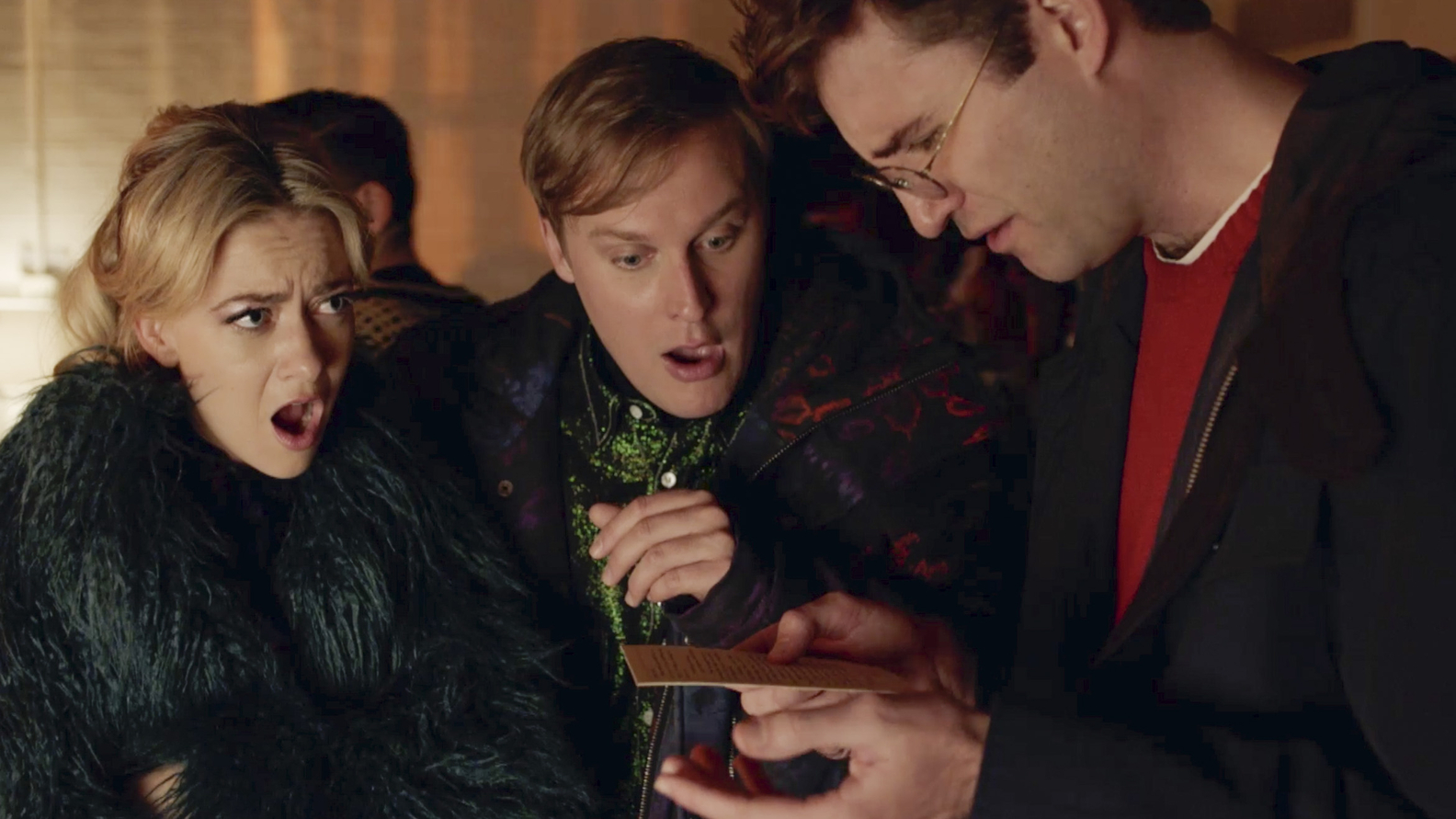by Christopher James
 Alia Shawkat returns as Dory Sief in the new fourth season of Search Party on HBO Max.Who doesn’t love a good quarantine binge? The minute HBO Max (finally) came on Roku, I began my binge of the first three seasons of Search Party. The beloved, niche TBS comedy about self-absorbed Brooklyn-ites became a strange, but satisfying watch during the day. Sure, the characters were unlikable enough to make the cast of Girls look like saints. Still, I couldn’t stop watching. Maybe that’s because there’s something satisfying about watching the character’s schemes and cover ups come unraveled. What began as a simple search party for a Facebook friend spirals into a murder trial three seasons later. The show continues to take big swings in season four that eventually pay off to be a highly memorable season of TV.
Alia Shawkat returns as Dory Sief in the new fourth season of Search Party on HBO Max.Who doesn’t love a good quarantine binge? The minute HBO Max (finally) came on Roku, I began my binge of the first three seasons of Search Party. The beloved, niche TBS comedy about self-absorbed Brooklyn-ites became a strange, but satisfying watch during the day. Sure, the characters were unlikable enough to make the cast of Girls look like saints. Still, I couldn’t stop watching. Maybe that’s because there’s something satisfying about watching the character’s schemes and cover ups come unraveled. What began as a simple search party for a Facebook friend spirals into a murder trial three seasons later. The show continues to take big swings in season four that eventually pay off to be a highly memorable season of TV.
The fourth season, available on HBO Max today, takes us simultaneously further from and closer to that first season premise...
After getting acquitted of murder, Dory Sief (Alia Shawkat) is captured by her stalker/biggest fan, Chip “The Twink” (Cole Escola). This leaves it to the three remaining members of this motley crew to piece together the clues to solve Dory’s own mystery. However, are they actually looking for her, or are they still licking their wounds from the recent murder trial and all of Dory’s past actions?
 Cole Escola (left) plays Chip, a stalker of Dory (Alia Shawkat - right) who captures her and holds her hostage.We first catch up with Dory in a Room-esque scenario, captured by Chip and housed in a bunker that suspiciously resembles her Brooklyn apartment. Chip sees Dory as his best friend and wants to make sure she is kept away from the world and her other friends. Cole Escola’s Instagram presence has been a source of non stop laughs throughout the pandemic and he was a standout star on Hulu’s Difficult People. Chip feels right at home in his wheelhouse, as he manages to be terrifying and hilarious at every turn. However, we spend so much time watching Dory in captivity that it feels as if the show turned the dial too far into the frightening territory. Shawkat shows impressive new sides to Dory as she is forced to let some of her more primal urges take over as she fights for her freedom. Yet, the torture that Chip puts her through often veers past humorous and into disturbing. The show regains its footing as it goes on, but the first few episodes are tougher than even Search Party fans are accustomed to. Perhaps, maybe the 10 month quarantine has made kidnapping and isolation fears more acute.
Cole Escola (left) plays Chip, a stalker of Dory (Alia Shawkat - right) who captures her and holds her hostage.We first catch up with Dory in a Room-esque scenario, captured by Chip and housed in a bunker that suspiciously resembles her Brooklyn apartment. Chip sees Dory as his best friend and wants to make sure she is kept away from the world and her other friends. Cole Escola’s Instagram presence has been a source of non stop laughs throughout the pandemic and he was a standout star on Hulu’s Difficult People. Chip feels right at home in his wheelhouse, as he manages to be terrifying and hilarious at every turn. However, we spend so much time watching Dory in captivity that it feels as if the show turned the dial too far into the frightening territory. Shawkat shows impressive new sides to Dory as she is forced to let some of her more primal urges take over as she fights for her freedom. Yet, the torture that Chip puts her through often veers past humorous and into disturbing. The show regains its footing as it goes on, but the first few episodes are tougher than even Search Party fans are accustomed to. Perhaps, maybe the 10 month quarantine has made kidnapping and isolation fears more acute.
 (from left to right) Meredith Hagner, John Early and John Reynolds all reprise their roles for season four of Search Party.While Dory is fighting for her life, naturally each of her friends have something better to do before actually seeking out to find her. Her former boyfriend Drew (John Reynolds) has dropped off the grid and found fulfilling work as an amusement park performer at Merry Merry Land. Both Elliott (John Early) and Portia (Meredith Hagner) find themselves in front of the camera in very different ways. Elliott finds success becoming a conservative news anchor thanks to his talents for embellishment. Meanwhile, Portia potentially finds her breakout role, starring in the movie based on the gang’s high profile murder case. Early and Hagner, in particular, are incredibly fun as these outsized narcissistic characters. They’ve only further refined the central joke for each of their characters. However, they need their “straight men” (aka Drew and Dory) in order to keep their storylines from becoming as over-the-top as something out of Unbreakable Kimmy Schmidt.
(from left to right) Meredith Hagner, John Early and John Reynolds all reprise their roles for season four of Search Party.While Dory is fighting for her life, naturally each of her friends have something better to do before actually seeking out to find her. Her former boyfriend Drew (John Reynolds) has dropped off the grid and found fulfilling work as an amusement park performer at Merry Merry Land. Both Elliott (John Early) and Portia (Meredith Hagner) find themselves in front of the camera in very different ways. Elliott finds success becoming a conservative news anchor thanks to his talents for embellishment. Meanwhile, Portia potentially finds her breakout role, starring in the movie based on the gang’s high profile murder case. Early and Hagner, in particular, are incredibly fun as these outsized narcissistic characters. They’ve only further refined the central joke for each of their characters. However, they need their “straight men” (aka Drew and Dory) in order to keep their storylines from becoming as over-the-top as something out of Unbreakable Kimmy Schmidt.
A critical ingredient feels missing early on. With Dory separated from the rest of the gang, the key camaraderie is broken and the show doesn’t do enough to address it. The show thrived on the chemistry of its four leads and how they simultaneously tolerated and enabled each other. Over the past four seasons, Dory has gone from the primary engine and glue of the group (seasons 1-2) to being the primary antagonist that unites them (season 3). In being the victim they need to rescue, her absence is felt within the group dynamic. Specifically, it’s harder to understand what binds Drew to Elliot or Portia. Still, it even takes a while for the “let’s find Dory” narrative to kick in. This is perhaps what makes early episodes feel not as successful. We go from watching a person kept in captivity withstand abuse from her captor to pure statis in the real world. It’s a dichotomy that doesn’t quite sit well in terms of tone.
 Susan Sarandon joins the Search Party cast for season four, along with many other new and familiar guest stars.We’ll keep the review spoiler free. Yet, it’s worth noting that while the first few episodes may be intentionally off-putting, the show really finds its groove in the back half of the fourth season. We get wacky guest stars, the return of some fan favorites and a genuinely moving conclusion. The balance between thrills and laughs works best during these moments because they build off each other, rather than working against each other. As the fourth season progresses, Search Party unearths the multiplicity of its seemingly and intentionally one-dimensional characters. While most shows this far in are struggling to figure out something new to do, Search Party continues to take wild narrative swings. Not all of them pay off right away. However, the overall vision for the show only becomes more and more clear and satisfying as it goes on. I can’t wait to see what comes next. B
Susan Sarandon joins the Search Party cast for season four, along with many other new and familiar guest stars.We’ll keep the review spoiler free. Yet, it’s worth noting that while the first few episodes may be intentionally off-putting, the show really finds its groove in the back half of the fourth season. We get wacky guest stars, the return of some fan favorites and a genuinely moving conclusion. The balance between thrills and laughs works best during these moments because they build off each other, rather than working against each other. As the fourth season progresses, Search Party unearths the multiplicity of its seemingly and intentionally one-dimensional characters. While most shows this far in are struggling to figure out something new to do, Search Party continues to take wild narrative swings. Not all of them pay off right away. However, the overall vision for the show only becomes more and more clear and satisfying as it goes on. I can’t wait to see what comes next. B
The first three episodes of Search Party season four are available on HBO Max on January 14th. The next three episodes will arrive on January 21st on HBO Max. The final four episodes will conclude the season on January 28th on HBO Max.
What are your thoughts about Search Party? Are you excited for season four?